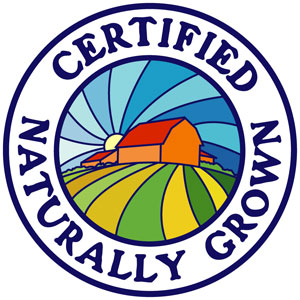 In 2002, a federal law passed that only allows products to be labeled “organic” if they have gone through the USDA certification process, but not every farmer who uses organic practices has the certification. The process is time consuming and also comes with a thousand dollar fee, and some small farmers simply find that the USDA’s program is a bad fit for the scale of their operations.
In 2002, a federal law passed that only allows products to be labeled “organic” if they have gone through the USDA certification process, but not every farmer who uses organic practices has the certification. The process is time consuming and also comes with a thousand dollar fee, and some small farmers simply find that the USDA’s program is a bad fit for the scale of their operations.
However, Certified Naturally Grown (CNG) offers farmers and beekeepers a way to assure consumers about their practices. We are frequently warned that the word “natural” is a marketing term used in greenwashing, but the farmers who participate in this program are committed to healthy and sustainable agriculture. “The O-word is forbidden unless you get special permission to use it, so we’re the alternative way to describe what they do,” explains Alice Varon, the executive director of Certified Naturally Grown. “It can be a very convenient short-hand way of communicating about their growing practices.”
There are 800 farms and apiaries located in 47 states that have the grassroots certification. From a consumer’s perspective, produce that carries the Certified Naturally Grown seal is equivalent to that which carries the USDA certification. It’s grown without synthetic fertilizers, pesticides, synthetic herbicides or fungicides. Certified Naturally Grown’s standards are based on internally recognized standards. “We’re not trying to define anything radically different,” says Varon.
Certified Naturally Grown uses a peer review process, which means that the inspectors are other farmers from the community. Varon explains that this helps to build a stronger farming community, but that customers shouldn’t be worried about mutual back-scratching. “Actually, the fellow farmers tend to be too hard on each other,” she says. “They are committed to protecting the program, especially if they’re in the CNG program, they want the standards to be upheld. So, they tend to call people out on stuff that’s not really an issue.”
Farmers typically digress from the standards for two reasons: either they didn’t realize something wasn’t permitted or in a moment of panic feel that using a synthetic chemical is their only option to save a crop. “A lot of people are forthcoming, saying ‘I didn’t know what else to do. I used this, I have to wait another year before I can be certified,’ ” says Varon. However, being a member of the Certified Naturally Grown community provides farmers with resources to avoid these situations. “By strengthening farmers networks and having farmers talking with each other more, a lot of information comes out and is shared that helps people anticipate problems before they become very big.”
You probably won’t see the Certified Naturally Grown seal in the supermarket any time soon, but you can find it at farmers markets across the country. In a very meaningful way, the CNG label restores credibility to the term “natural” and assures customers that they’re buying products that will be nourishing to their families and won’t degrade earth’s ecology.
To find farms and apiaries near you that are Certified Naturally Grown, visit NaturallyGrown.org.
